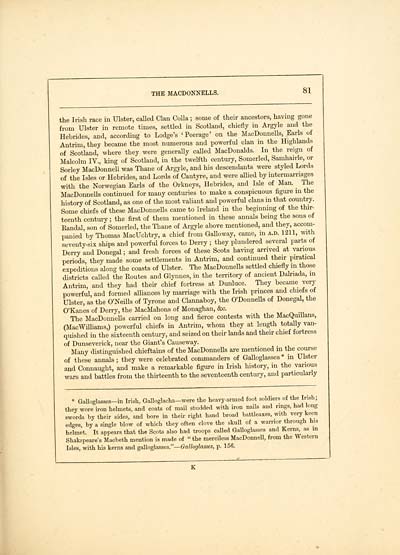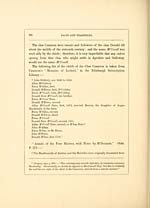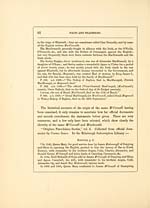Facts and traditions collected for a family record
(93) Page 81
Download files
Complete book:
Individual page:
Thumbnail gallery: Grid view | List view

THE MACDONNELLS.
81
the Irish race in Ulster, called Clan Colla ; some of their ancestors, having gone
from Ulster in remote times, settled in Scotland, chiefly in Argyle and the
Hebrides, and, according to Lodge's 'Peerage' on the MacDonnells, Earls of
Antrim, they became the most numerous and powerful clan in the Highlands
of Scotland, where they were generally called MacDonalds. In the reign of
Malcolm IV., king of Scotland, in the twelfth century, Somerled, Samhairle, or
Sorley MacDonnell was Thane of Argyle, and his descendants were styled Lords
of the Isles or Hebrides, and Lords of Cantyre, and were allied by intermarriages
with the Norwegian Earls of the Orkneys, Hebrides, and Isle of Man. The
MacDonnells continued for many centuries to make a conspicuous figure in the
history of Scotland, as one of the most valiant and powerful clans in that country.
Some chiefs of these MacDonnells came to Ireland in the beginning of the thir-
teenth century ; the first of them mentioned in these annals being the sons of
Eandal, son of Somerled, the Thane of Argyle above mentioned, and they, accom-
panied by Thomas MacUchtry, a chief from Galloway, came, in a.d. 1211, with
seventy-sis ships and powerful forces to Derry ; they plundered several parts of
Derry and Donegal ; and fresh forces of these Scots having arrived at various
periods, they made some settlements in Antrim, and continued their piratical
expeditions along the coasts of Ulster. The MacDonnells settled chiefly in those
districts called the Routes and Glynnes, in the territory of ancient Dalnada, in
Antrim, and they had their chief fortress at Dunluce. They became very
powerful, and formed alliances by marriage with the Irish princes and chiefs of
Ulster, as the O'Neills of Tyrone and Clannaboy, the O'Dounells of Donegal, the
O'Kanes of Derry, the MacMahons of Monaghan, &c.
The MacDonnells carried on long and fierce contests with the MacQuillans,
(MacWilliams,) powerful chiefs in Antrim, whom they at length totally van-
quished in the sixteenth century, and seized on their lands and their chief fortress
of Dunseverick, near the Giant's Causeway.
Many distinguished chieftains of the MacDonnells are mentioned in the course
of these annals; they were celebrated commanders of Galloglasses * in Ulster
and Connaught, and make a remarkable figure in Irish history, in the various
wars and battles from the thirteenth to the seventeenth century, and particularly
* Galloglasses-in Irish, Galloglacha-were the heavy-armed foot soldiers of the Irish;
they wore iron helmets, and coats of mail studded with iron nails and rings, had long
swords by their sides, and bore in their right hand broad battleaxes, with very keen
edges, by a single blow of which they often clove the skull of a warrior through his
helmet. It appears that the Scots also had troops called Galloglasses and Kerns, as in
Shakspeare's Macbeth mention is made of " the merciless MacDonnell, from the Western
Isles, with his kerns and galloglasses."— Galloglasses, p. 156.
81
the Irish race in Ulster, called Clan Colla ; some of their ancestors, having gone
from Ulster in remote times, settled in Scotland, chiefly in Argyle and the
Hebrides, and, according to Lodge's 'Peerage' on the MacDonnells, Earls of
Antrim, they became the most numerous and powerful clan in the Highlands
of Scotland, where they were generally called MacDonalds. In the reign of
Malcolm IV., king of Scotland, in the twelfth century, Somerled, Samhairle, or
Sorley MacDonnell was Thane of Argyle, and his descendants were styled Lords
of the Isles or Hebrides, and Lords of Cantyre, and were allied by intermarriages
with the Norwegian Earls of the Orkneys, Hebrides, and Isle of Man. The
MacDonnells continued for many centuries to make a conspicuous figure in the
history of Scotland, as one of the most valiant and powerful clans in that country.
Some chiefs of these MacDonnells came to Ireland in the beginning of the thir-
teenth century ; the first of them mentioned in these annals being the sons of
Eandal, son of Somerled, the Thane of Argyle above mentioned, and they, accom-
panied by Thomas MacUchtry, a chief from Galloway, came, in a.d. 1211, with
seventy-sis ships and powerful forces to Derry ; they plundered several parts of
Derry and Donegal ; and fresh forces of these Scots having arrived at various
periods, they made some settlements in Antrim, and continued their piratical
expeditions along the coasts of Ulster. The MacDonnells settled chiefly in those
districts called the Routes and Glynnes, in the territory of ancient Dalnada, in
Antrim, and they had their chief fortress at Dunluce. They became very
powerful, and formed alliances by marriage with the Irish princes and chiefs of
Ulster, as the O'Neills of Tyrone and Clannaboy, the O'Dounells of Donegal, the
O'Kanes of Derry, the MacMahons of Monaghan, &c.
The MacDonnells carried on long and fierce contests with the MacQuillans,
(MacWilliams,) powerful chiefs in Antrim, whom they at length totally van-
quished in the sixteenth century, and seized on their lands and their chief fortress
of Dunseverick, near the Giant's Causeway.
Many distinguished chieftains of the MacDonnells are mentioned in the course
of these annals; they were celebrated commanders of Galloglasses * in Ulster
and Connaught, and make a remarkable figure in Irish history, in the various
wars and battles from the thirteenth to the seventeenth century, and particularly
* Galloglasses-in Irish, Galloglacha-were the heavy-armed foot soldiers of the Irish;
they wore iron helmets, and coats of mail studded with iron nails and rings, had long
swords by their sides, and bore in their right hand broad battleaxes, with very keen
edges, by a single blow of which they often clove the skull of a warrior through his
helmet. It appears that the Scots also had troops called Galloglasses and Kerns, as in
Shakspeare's Macbeth mention is made of " the merciless MacDonnell, from the Western
Isles, with his kerns and galloglasses."— Galloglasses, p. 156.
Set display mode to:
![]() Universal Viewer |
Universal Viewer | ![]() Mirador |
Large image | Transcription
Mirador |
Large image | Transcription
Images and transcriptions on this page, including medium image downloads, may be used under the Creative Commons Attribution 4.0 International Licence unless otherwise stated. ![]()
| Histories of Scottish families > Facts and traditions collected for a family record > (93) Page 81 |
|---|
| Permanent URL | https://digital.nls.uk/95522101 |
|---|
| Description | A selection of almost 400 printed items relating to the history of Scottish families, mostly dating from the 19th and early 20th centuries. Includes memoirs, genealogies and clan histories, with a few produced by emigrant families. The earliest family history goes back to AD 916. |
|---|

